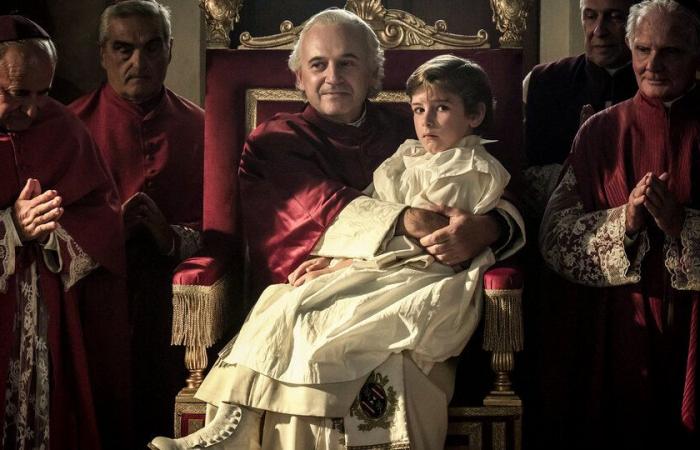“This story begins in March 1852 in Bologna, where the Mortara family lived. Edgardo, the sixth child, was six months old. Bologna belonged to the Papal States and Pius IX was the Pope-King.” The plate at the beginning of The conversion places the viewer in a specific moment in Italian history, times in which the Roman Catholic Apostolic Church still dominated a part of the country and its regime of political influence was going through the last two decades of its existence. Shortly before the Statue of the Church formally disappeared, in 1870, and long before Benito Mussolini gave the green light for the creation of Vatican City. That Edgardo who quotes the phrase is Edgardo Mortara Levi, the son of a Jewish family who, shortly before turning seven years old, was taken from his parents and transferred to Rome. The reason was transparent and irrefutable, at least for the Congregation of the Holy Office and the papacy: the child had been secretly baptized by a domestic servant of the Mortara and, therefore, could no longer live under the roof of a Hebrew family. .
The very real Mortara Case was a cause célèbre at a time when journalism was acquiring a place of increasing relevance in modern societies. It was also the name of a tireless fight on the part of the family to recover their son and also the unrestricted defense of the Church to raise Edgardo as a full-fledged Christian. Edgardo Mortara was a Catholic priest throughout his adult life and he died in the Belgian city of Liege in 1940, at the age of 88, wearing ecclesiastical vestments. But that is another story. The one who narrates the new feature film by the Italian master Marco Bellocchio -whose original title, Rapitocan be literally translated as “Abducted” or “Kidnapped” – is the story of the desperation of a mother and father, the obstinacy of a supreme pontiff faced with the end of an era and that of a child shaken by two religious traditions that clash. they disputed it. For the Mortara, the loss of one of their loved ones; for the Pope, the symbol of a power that was about to be exhausted.
Marco Bellocchio, who will be 84 years old at the end of 2024, the director of great classics of the renewal of Italian cinema such as I fought in tasca (1965) and In the name of the Father (1971), and also that scandal film called The devil in the body (1986), has been enjoying a prolific and fruitful creative period for a couple of decades.. To titles produced towards the beginning of the millennium such as The time of religion (2002) and Vincere (2009) was recently joined by notable films such as Blood of my Blood, Beautiful mine and the first-person documentary Marx can waitin addition to the extraordinary miniseries for Italian television Sternum notte. A stage that finds him reconciled with a style of classical narration that was not part of his first artistic marks, and that The conversion confirms with amply and creativity. His last feature film, which It competed last year in the official section of the Cannes Festival and now reaches cinemas in Argentina, is narrated in three large time blocks: a first period that corresponds to the “abduction”, the arrival at the religious school where he will spend the following years and the parents’ attempts to recover him; a second in which the trial of the priest of the Holy Inquisition in charge of executing the transfer order occupies the center of the story; and a third, the briefest, with an adult Edgar attending the last years of Pius IX’s papacy and, finally, his temporary return to his maternal home.
“Non possumus,” says the Pope, played with intriguing firmness by Paolo Pierobon, in response to requests from the Mortara family, various European Jewish organizations and even the Rothschild dynasty itself for the child to be returned. The pontiff observes some of the caricatures that are published about him in international newspapers and one of them causes him a nightmare that shocks him to the point of screaming: a group of rabbis sneak into his bedroom and, sharp instruments in hand, proceed to circumcise him. . Meanwhile, Edgardo, who has just been baptized in full ecclesiastical law and has begun to learn not only the prayers but also the strictest definitions of Catholic dogma, dreams that he removes the nails from the statue of Jesus Christ and it descends and walks among the rows of benches, but not before giving him a merciful look. Under the sheets, on the cot, Edgardo hides a mezuzah, although a cross hangs near his heart. The conversion has not yet occurred.
Edgardo’s former nurse confesses, a little in Italian and a little in Bolognese, a dialect that the judge can barely understand. Fearing that the sick baby would die without being baptized and, therefore, his soul would spend eternity in limbo, he poured a few drops of water on his forehead and moved his fingers in the shape of a cross. In Rome the boy has already taken the step of confirmation, and the rejection of his own family (“the Jews killed Jesus,” he remembers what a priest told him shortly after arriving) has begun to become flesh, to form an inseparable part of your mind and spirit. Despite the anticlerical tone that he conveys The conversion, with that Pope locked in his indisputable creed and role (because the habit, in this case, makes the monk), violently pushed by his most faithful admirer as a consequence of an unconditional love for the leader (“From now on they are soldiers of God ”says another priest before the audience of altar boys), Bellocchio declared at a press conference during the Cannes Film Festival that “this is not a political film. I did not do it with the intention of taking a political point of view or declaiming an anti-church position. The conversion It does not seek to confront one another. But this man’s destiny spoke to me and inspired me. His story filled me with tensions and feelings. And those emotions are what forged the path to shape the film. My sympathies are clearly on the side of that child who suffered an act of extreme violence. Naturally, what Edgardo Mortara experienced could not happen today, in an era of constant dialogue and an open-minded Pope. But in those times there was the concept that the Catholic faith did not allow any kind of questioning.”
The story of little Mortara is the story of a forced transformation, a form of survival, against the background of enormous social changes and an Italy in search of building its own republic. It is the painful story of a mutation and obfuscation supported by the force of a still powerful institution, exerted with force on a fragile being. It is also the film of a filmmaker who takes a forgotten case in history to transform it into a powerful story, larger than life, at times operatic and definitely tragic.






